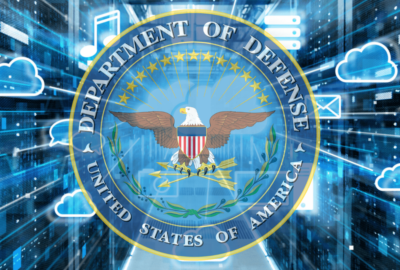Exclusive
In JWCC cloud procurement, Pentagon plans a novel approach to competition
The Pentagon will conduct task order-level competitions as part of its new JWCC contract, but vendors won't have much room to argue.
The Defense Department’s plans for enterprise cloud computing have been beset from the very outset by questions about fair competition. And now that DoD has moved on to a multi-vendor approach to replace its JEDI contract, one of the biggest questions has been whether it will let all four of its pre-selected firms freely compete for work within the new Joint Warfighting Cloud Capability (JWCC) ecosystem.
The answer turns out to be yes, in a sense. It’s not the sort of competition most government procurement professionals would recognize, mainly because it’s never quite been done this way before.
In an exclusive interview with Federal News Network, Danielle Metz, DoD’s deputy chief information officer for information enterprise, detailed the department’s thinking about how the new structure will work in practice.
Under JWCC, DoD will parcel out several billion dollars in cloud spending through smaller awards it will issue as task orders. But the companies competing for that work will never actually submit bids for each discrete chunk of DoD’s enterprise cloud. Instead, a computer system and a centralized program office will be in charge of deciding precisely which firm is best suited for each piece of JWCC, and issue orders accordingly.
In an apparent nod to JEDI’s Star Wars theme, the system is called AT-AT (short, in this case, for Account Tracking and Automation Tool). Housed within the Defense Information Systems Agency’s Hosting and Compute Center, it’s meant to keep track of each JWCC contractor’s service offerings and prices, and use that information to help DoD’s cloud computing program office decide which vendor should get a particular task order.
Metz said the department settled on the approach mainly as a way to accelerate the cloud acquisition process.
“Typically, a task order like that takes 30 to 45 days. That is unsatisfactory, and we are working very creatively within the bounds of the [Federal Acquisition Regulation] to take that down to five to 10 days,” she said. “This is very revolutionary, and I think it shows the department’s commitment in terms of wanting to transform our business processes so that we can get effective capabilities quicker to our warfighter.”
JWCC’s structure is also unusual in that that DoD chose to create separate indefinite-delivery/indefinite-quantity contracts, with each vendor as the sole awardee. The more traditional ID/IQ structure — and one ordinarily demanded by federal procurement law — is one where each vendor has a spot on a multiple-award ID/IQ contract, and then responds to the government’s requirements by submitting quotations for individual products.
The structure also appears to limit opportunities for bid protests. Current law does allow protests of large task orders, but that framework mainly contemplates cases where several companies are part of the same ID/IQ contract and then compete for task orders under the same contract.
DoD has not yet said which legal exceptions it intends to use to justify separate sole-source, single-award ID/IQs to the JWCC contract holders. It’s highly likely that Amazon, Microsoft, Oracle and Google will each receive such an award; the department issued directed solicitations to those companies last month after determining they were all capable of meeting its needs under JWCC, but those solicitations aren’t an ironclad guarantee that each company will actually get its own ID/IQ.
JWCC differs from JEDI in another key way: The department has no immediate plans to force the military services to use the contract for their cloud requirements.
During the past three years of bid protests that left the JEDI contract in legal limbo, the Army, Navy and Air Force each developed their own enterprise approaches to contracting for cloud computing. And the Pentagon sees no immediate reason to interfere with the cloud acquisition approaches they’ve chosen.
“That body of work and the lessons they’ve learned from that, the cloud conversancy and fluency that’s coming from those current contracts, that will all continue, and then be folded into JWCC,” Metz said. “But only if the services deem that JWCC meets their requirements. We’re not mandating JWCC. This is really for the combatant commands and Defense agencies first.”
The initial focus on DoD’s “fourth estate” is largely because department leaders see those organizations as having the largest unmet need for cloud services at the moment, Metz said.
“What the combatant commands don’t have is ubiquitous access to cloud infrastructure and the associated services, nor do the [Defense agencies]. That’s why we’re targeting them first, and then opening the door to the services if they have unmet needs,” she said. “Maybe they don’t have tactical edge or [secret level] or top-secret cloud services — they’ll be able to use JWCC.”
In general, they don’t. And DoD expects that even the military services who’ve already developed robust cloud plans and acquisition approaches will lean on JWCC too, assuming it meets its promise to deliver cloud services at all three classification levels, up to top secret, and up to the tactical edge, by next year.
That expectation is part of the reason the department told Amazon, Microsoft, Google and Oracle that it was setting a very high ceiling value when it sent them solicitations last month. The department projects JWCC will be worth up to $9 billion over five years, assuming it exercises all of its contract options, which allow for two option years beyond JWCC’s initial three-year base period.
But it’s far from clear that the department will exercise all of those options, because JWCC might be superseded by another contract structure by the end of the full five-year period.
Metz said DoD plans to launch another competition for enterprise cloud services roughly one year after it awards contracts for JWCC (a process that’s currently expected to be completed by the end of March 2022).
“The department is committed to doing full-and-open competition,” she said. “[The next procurement] would be for any company that can meet the department’s requirements. In effect, it would create the department’s cloud marketplace, commensurate with what the intelligence community has with their C2E contract.”
In the meantime, DoD has a lot on its plate just figuring out how AT-AT and JWCC’s quasi-competitions at the task order level will actually work.
Notionally, the idea is that a DoD component-level official — the “mission owner” — will let the JWCC program management office know what its needs for cloud services are.
“The PMO’s customer engagement team will work very closely with [the mission owner] to make sure that they are tailoring requirements in a manner that meets their mission need. That’s what will go into the automated provisioning tool to be able to execute and complete that task,” Metz said.
But what if a component-level CIO already knows for certain that his or her agency wants to buy a particular cloud offering from one of JWCC’s cloud providers?
Metz said DoD isn’t yet willing to promise that sort of autonomy.
“I think it’s premature for me to say that. It’s all about requirements,” she said. “Tailoring the requirements to be able to meet the mission’s need is critical. The partnership with the program office that will have the technical acumen to shepherd everything through, and then executing it through the provisioning tool. That’s how I envision all of this taking place.”
Copyright © 2025 Federal News Network. All rights reserved. This website is not intended for users located within the European Economic Area.
Jared Serbu is deputy editor of Federal News Network and reports on the Defense Department’s contracting, legislative, workforce and IT issues.
Follow @jserbuWFED







